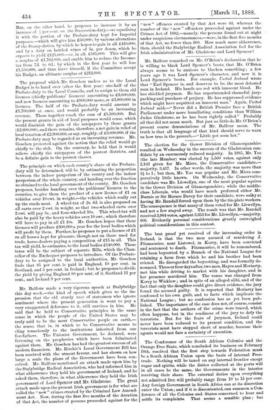The principle on which each county's share of the Probate-
duty will be determined, will be by estimating the proportion between the indoor pauperism of the county and the indoor pauperism of the whole country, and handing over the fraction so obtained to the local government of the county. Mr. Goschen proposes, besides handing over the publicans' licences to the counties, to give them the product of a new licence of £1 on vehicles over 10 cwt. in weight,—the vehicles which really cut up the roads most. A wheel-tax of 2s. 6d. is also proposed on all carts over 2 cwt. in weight, so that two-wheeled carts over 2 cwt. will pay 5s., and four-wheeled 10s. This wheel-tax will also be paid by the heavy vehicles over 10 cwt., which therefore will have to pay in all 21 10s. Mr. Goschen hopes that these licences will produce 2300,000 a year for the local bodies which will profit by them. Further, he proposes to put a licence of £1 on all horses kept for pleasure, though not on those used for trade, horse-dealers paying a composition of £15 in all. This tax will yield, he estimates, to the local bodies £540,000. These taxes will be the subject of separate Bills, which the Chan- cellor of the Exchequer proposes to introduce. Of the Probate- duty to be assigned to the local authorities, Mr. Goschen finds that 85 per cent. is paid in England, 10 per cent. in Scotland, and 5 per cent. in Ireland ; but he proposes to divide the yield by giving England 80 per cent. of it, Scotland 11 per cent., and Ireland 9 per cent.


































 Previous page
Previous page